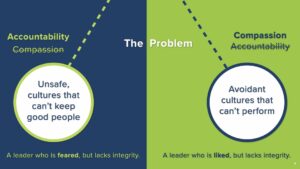
My Five Beefs With the Current Understanding and Practice of Compassion
Share viaThe prevailing understanding and practice of compassion at work is limiting and creates barriers to entry for many leaders and organizations. We need to expand our view of compassion if we want to make a bigger difference in a world that desperately needs it. Here are my top five beefs.
BEEF #1: Stop Aligning Compassion Only With Empathy
Compassion is MORE than empathy in action
The most common researcher’s definition of compassion goes like this, “Being stirred by another’s suffering and taking action to alleviate that suffering.”
I’m not against empathy. We need more of it in our world and we all need to cultivate our ability to tune in to how others are doing. However, relying on empathy as the only motivator or “on-ramp” to compassionate behavior fails to account for diversity in human perception and motivation.
Empathy might not be everyone’s strong suit, but they still deserve an invitation and pathway towards compassionate behavior.
People can be motivated into action to help others for many reasons and in many ways other than empathy. Learn about six motivators of compassion in Chapter 9 of my book, Compassionate Accountability.
BEEF #2: Stop Trying to Fix Everything (and Everybody!)
Compassion is MORE than just alleviating suffering
Sometimes you can’t fix the problem. Sometimes you can’t make the suffering go away. And sometimes, especially in the world of work, it’s counterproductive to do so. Taking away the struggle also takes away opportunities to learn, grow, and exercise self-determination.
If you approach compassion as something you do “to” or “for” someone else, you creat a power differential in the relationship.
Top talent doesn’t want fixers. They want coaches, mentors, and guides.
The word compassion originates from the Latin root meaning to “suffer with.” In many situations, the best thing you can do is get alongside someone and support them through the struggle. Here’s a piece about the power of being with people during the struggle instead of trying to fix it.
BEEF #3: Stop Talking About Compassion As A Soft Skill
Compassion is a real skill and it’s extremely challenging to do well.
One of the biggest barriers to compassion for many people is the fear that it will be perceived as weak. “If you show compassion people will take advantage of you and won’t respect you.” Framing compassion as a soft skill doesn’t help with this problem.
At Next Element we’ve trained thousands of people to be more compassionate in their lives, and here’s what they discover:
Compassion requires the bravery to be vulnerable, the confidence to be humble, and the courage to walk the talk.
Beyond empathy and being kind comes the gritty work of self-awareness, self-management, and integrity. These aren’t for the faint of heart. An integral component of compassion is emotional literacy and authenticity. According to Brené Brown, there are eighty-seven distinct human emotions. How well can you recognize, articulate, and authentically express even a portion of these? That’s a lifetime of hard work.
BEEF #4: Stop Trying To Be So Altruistic
Compassion benefits the giver and the receiver. If it doesn’t, you aren’t doing it right.
“Give til it hurts.” “Put others first.” If this is your approach to compassion, you will be burned out in a short time. Struggling alongside others requires that our tank is full, that we know who we are in the relationship, and that we take care of our boundaries along the way. Did you know that empathy triggers the pain centers of the brain? If you spend all your time focused on other people’s pain, carrying that around and trying to fix it, that’s not sustainable. What has been popularized as “Compassion Fatigue” should be more appropriately called Empathy Fatigue.
Compassion lights up the reward centers of the brain.
Real compassion is a mutually beneficial feedback loop that triggers the release of pleasure and joy chemicals like oxytocin and serotonin.
When we train people to use ORPO, our formula for Compassionate Accountability, they report feelings of exhilaration, new energy, and unexpected relief, even through conflict.
BEEF #5: Stop Acting Like Compassion and Accountability Work Against Each Other
Compassion without accountability enables dependence and undermines capability. Accountability without compassion is inhumane and undermines psychological safety.

Most of the strife in our world originates from the false belief that compassion and accountability are somehow opposites.
When we view it this way, we create a fake, forced choice. When there are differences and disagreements, conflict and disruption, we feel cornered, like we have to choose one over the other. We justify it like it’s a necessary evil. Consider these statements.
“You can’t be someone’s friend and boss a the same time.”
“I don’t want to be a jerk, but we need to get stuff done.”
“I’m just practicing tough love.”
We seriously need to change the way we look at compassion and embrace the reality that you can practice compassion and accountability at the same time, without compromises.
My new book, Compassionate Accountability: How Leaders Build Connection And Get Results, challenges the current compassion paradigm and presents a breakthrough framework for leaders to design thriving workplaces.
 “Compassionate Accountability is a bracing corrective to our misperceptions about this trait and a practical guide for deepening anyone’s leadership capabilities.”
“Compassionate Accountability is a bracing corrective to our misperceptions about this trait and a practical guide for deepening anyone’s leadership capabilities.”
– Dan Pink, NYT Bestselling author
Copyright, Next Element Consulting, LLC 2024
Transform Your Culture with Compassionate Accountability
Book Your Next Keynote Speaker

Author and Co-founder of Next Element, Dr. Nate Regier is available to speak at your upcoming event.
Submit a Speaker RequestListen to Nate on The Compassionate Accountability Podcast
 Listen to the Podcast
Listen to the Podcast

0 Comments
Add comment